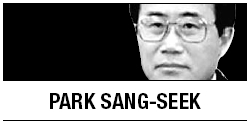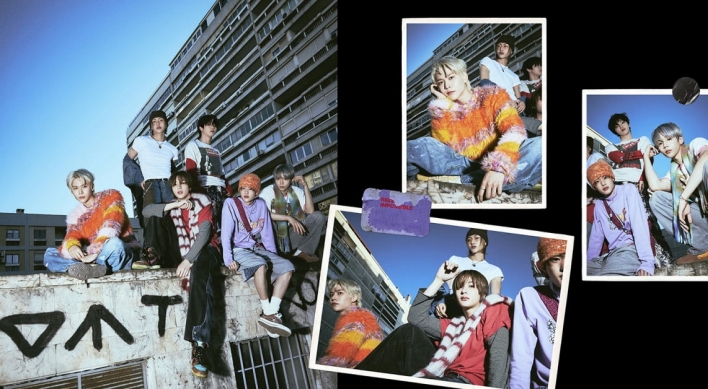[Park Sang-seek] Ideological polarization in capitalist democracies
ByPublished : Sept. 15, 2011 - 19:03
After the cold war ended, the ideological conflict between East and West ended and the wind of democracy blew in the East and the South, but history has not ended. Instead, the North-South divide which had already emerged in the cold war period has become more serious and a new grand debate on the clash of civilizations and an ideological bipolarization between the West and the New East represented by China has emerged. Some scholars and pundits argue that Western civilization will continue to dominate the world although American hegemony may decline. But very few have raised the question of whether an ideological bipolarization within Western democratic states is emerging.

The Old West is being replaced by a New West. The New West includes Western European and North American countries (the NATO members) on the one hand and the former Soviet bloc countries in Eastern Europe and newly developed and democratic countries in Asia on the other. The rest of the world is the New East. The liberal international order founded on liberal democracy and capitalism is being undermined by both the ideological bipolarization between the New West and the New East and that within the New West.
The liberal international order is challenged by the New East claiming that Western civilization and values are not necessarily good for humanity and capitalism is bad for the co-prosperity of all states and the equitable distribution of wealth among nations and peoples. Similar arguments have been gaining force in the New West, particularly since the recent international financial crisis.
Let us take two cases: South Korea and the U.S. Both countries belong to the New West; the political and economic system of the former is modeled on that of the latter ― liberal democracy and capitalism. Lately, welfare populism is a hot political issue in both countries. In both countries the progressives demand lowering taxes for the low-income people and small and medium-size companies while the conservatives call for lowering taxes for high-income people and big corporations. The incumbent governments of both countries push for a compromised proposal. Both countries are afflicted with ideological bipolarization. The conservatives in both countries claim that populism destroys democracy and capitalism, which are the very foundation of their respective countries. The liberals and radicals counterattack by arguing that populism buttresses democracy and is not incompatible with capitalism. The liberals tend to support revised capitalism and the radicals social democracy.
Capitalist democratic states suffer from both democratic and capitalist deficits. The masses can be easily attracted to populist slogans and platforms because they are powerless individually and underprivileged economically. They can gain power through their sheer exercise of vote if they can unite under strong political leadership. They become politically active when they suffer from extreme poverty or physical insecurity.
In contrast, upper class people, even though they are numerically in the minority, can control the government through aligning with political elites. The middle class people are likely to be divided into conservative, liberal and radical groups, depending on their intellectual upbringing and socio-economic status, and are becoming powerless. Consequently, the ideological bipolarization between left and right is intensifying. In this ideological chasm, democracy suffers from oligarchic rule or populist dictatorship, while pluralistic rule is rarely realized, particularly in an unstable political situation.
The coexistence of democracy and capitalism can be mutually reinforcing or detrimental. If we contrast the main principles of both systems with each other, we can see why. Both advocate individualism and free competition (for political power in democracy and economic gains in capitalism). These principles can contribute to the development of both democracy and capitalism. In contrast, democracy upholds political freedoms and majority rule, and capitalism economic freedoms and market rule. Political and economic freedoms can be reinforcing of each other, but majority rule and market rule can be detrimental to each other. On the other hand, capitalism is vulnerable to big business domination and economic inequality.
However, the most serious shortcoming of democracy and capitalism is individualism. If individualism goes to the extreme, it becomes egoism. But fraternity (cooperation or co-prosperity) is a prerequisite for all stable and prosperous states. Cooperation is founded on trust and tolerance. Scholars agree that economic development is a prerequisite for democracy and democracy lasts long in an economically prosperous state. But as Ronald Inglehart and Christian Welzel found out, stable democracy requires the political culture emphasizing tolerance of diversity, interpersonal trust, life satisfaction, and liberty and participation. In the U.S. that political culture is eroding, while in South Korea it is yet to grow.
In non-democratic states the government is mostly responsible for political instability and poverty, while in democratic states the people are ultimately responsible for them, because they choose their government. In this sense, South Korea and the U.S. are in the same boat.
By Park Sang-seek
Park Sang-seek is a professor at the Graduate Institute of Peace Studies, Kyung Hee Universtiy. ― Ed.

The Old West is being replaced by a New West. The New West includes Western European and North American countries (the NATO members) on the one hand and the former Soviet bloc countries in Eastern Europe and newly developed and democratic countries in Asia on the other. The rest of the world is the New East. The liberal international order founded on liberal democracy and capitalism is being undermined by both the ideological bipolarization between the New West and the New East and that within the New West.
The liberal international order is challenged by the New East claiming that Western civilization and values are not necessarily good for humanity and capitalism is bad for the co-prosperity of all states and the equitable distribution of wealth among nations and peoples. Similar arguments have been gaining force in the New West, particularly since the recent international financial crisis.
Let us take two cases: South Korea and the U.S. Both countries belong to the New West; the political and economic system of the former is modeled on that of the latter ― liberal democracy and capitalism. Lately, welfare populism is a hot political issue in both countries. In both countries the progressives demand lowering taxes for the low-income people and small and medium-size companies while the conservatives call for lowering taxes for high-income people and big corporations. The incumbent governments of both countries push for a compromised proposal. Both countries are afflicted with ideological bipolarization. The conservatives in both countries claim that populism destroys democracy and capitalism, which are the very foundation of their respective countries. The liberals and radicals counterattack by arguing that populism buttresses democracy and is not incompatible with capitalism. The liberals tend to support revised capitalism and the radicals social democracy.
Capitalist democratic states suffer from both democratic and capitalist deficits. The masses can be easily attracted to populist slogans and platforms because they are powerless individually and underprivileged economically. They can gain power through their sheer exercise of vote if they can unite under strong political leadership. They become politically active when they suffer from extreme poverty or physical insecurity.
In contrast, upper class people, even though they are numerically in the minority, can control the government through aligning with political elites. The middle class people are likely to be divided into conservative, liberal and radical groups, depending on their intellectual upbringing and socio-economic status, and are becoming powerless. Consequently, the ideological bipolarization between left and right is intensifying. In this ideological chasm, democracy suffers from oligarchic rule or populist dictatorship, while pluralistic rule is rarely realized, particularly in an unstable political situation.
The coexistence of democracy and capitalism can be mutually reinforcing or detrimental. If we contrast the main principles of both systems with each other, we can see why. Both advocate individualism and free competition (for political power in democracy and economic gains in capitalism). These principles can contribute to the development of both democracy and capitalism. In contrast, democracy upholds political freedoms and majority rule, and capitalism economic freedoms and market rule. Political and economic freedoms can be reinforcing of each other, but majority rule and market rule can be detrimental to each other. On the other hand, capitalism is vulnerable to big business domination and economic inequality.
However, the most serious shortcoming of democracy and capitalism is individualism. If individualism goes to the extreme, it becomes egoism. But fraternity (cooperation or co-prosperity) is a prerequisite for all stable and prosperous states. Cooperation is founded on trust and tolerance. Scholars agree that economic development is a prerequisite for democracy and democracy lasts long in an economically prosperous state. But as Ronald Inglehart and Christian Welzel found out, stable democracy requires the political culture emphasizing tolerance of diversity, interpersonal trust, life satisfaction, and liberty and participation. In the U.S. that political culture is eroding, while in South Korea it is yet to grow.
In non-democratic states the government is mostly responsible for political instability and poverty, while in democratic states the people are ultimately responsible for them, because they choose their government. In this sense, South Korea and the U.S. are in the same boat.
By Park Sang-seek
Park Sang-seek is a professor at the Graduate Institute of Peace Studies, Kyung Hee Universtiy. ― Ed.






![[New faces of Assembly] Architect behind ‘audacious initiative’ believes in denuclearized North Korea](http://res.heraldm.com/phpwas/restmb_idxmake.php?idx=644&simg=/content/image/2024/05/01/20240501050627_0.jpg&u=20240502093000)











![[Today’s K-pop] Sunmi to drop single next month](http://res.heraldm.com/phpwas/restmb_idxmake.php?idx=642&simg=/content/image/2024/05/03/20240503050545_0.jpg&u=)